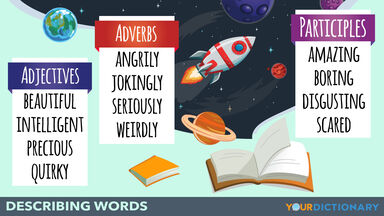Creative Writing Words Dictionary
List of Descriptive Words: Adjectives, Adverbs & Participles
Descriptive language appeals to all five of our senses: taste, touch, sight, smell, and sound. When used correctly, descriptive words can make your writing more vivid and compelling. Choose from a list of descriptive words, including adjectives, adverbs and participles, that is sure to enhance your writing.
 Descriptive Words Adjectives Adverbs and Participles
Descriptive Words Adjectives Adverbs and Participles
Adjectives as Descriptive Words
Adjectives are the most common type of descriptive words. They help us know that a sunset is gorgeous or a cat is acrobatic. Explore a list of adjective examples.
| acrobatic | adorable | adventurous |
| brave | bright | brilliant |
| concrete | conventional | delirious |
| foolhardy | gregarious | grim |
| handsome | handy | intelligent |
| intrepid | joyful | jubilant |
| keen | kooky | lanky |
| lazy | limp | luxurious |
| mediocre | mellow | miserable |
| nocturnal | organic | ornate |
| ordinary | powerless | practical |
| precious | questionable | quirky |
| radiant | rustic | sly |
| sophisticated | stunning | tattered |
| thorny | verdant | weathered |
Adjectives typically come before the noun they describe. However, when you use a predicate adjective to modify your subject, you'll find the adjective after the noun. You can also use adjectives and the words after them as adjective phrases for even more descriptive power!
Adverbs as Descriptive Words
While adjectives provide further description for nouns, adverbs modify other parts of speech, including verbs, adjectives and other adverbs. Adverbs describe concepts such as time, place, circumstance, manner, or degree.
| amusingly | angrily | apathetically |
| assertively | begrudgingly | blissfully |
| chillingly | coyly | darkly |
| dazzlingly | deafeningly | dutifully |
| eagerly | faintly | frivolously |
| greedily | hastily | intelligently |
| kindly | lavishly | lazily |
| listlessly | masterfully | meagerly |
| methodically | neglectfully | normally |
| offensively | passionately | pleasantly |
| pointlessly | quickly | rapidly |
| rashly | secretly | seriously |
| swiftly | tactfully | teasingly |
| tragically | vacantly | vividly |
| weirdly | youthfully | zealously |
As you scroll through the list of descriptive adverbs, you'll notice that the adverbs all end in -ly. However, remember that there are other examples of adverbs, like "almost" or "seldom," that do not share this ending. Using the proper amount of adverbs can really strengthen your writing.
Participles as Descriptive Words
When verbs function as describing words, they're known as participles. You'll find participles before nouns they modify, just like adjectives. Past participles end in -ed or -en, while present participles end in -ing.
| acclaimed | accomplished | amazing |
| amused | battered | beaten |
| bleeding | boring | broken |
| confusing | chosen | complicated |
| condemned | crystallized | customized |
| depressed | disgusting | distressing |
| disturbing | dreaming | driven |
| dyed | embarrassing | exciting |
| fascinated | frustrating | humiliating |
| interesting | irritating | lying |
| melted | overwhelmed | puzzling |
| relaxing | riveting | satisfied |
| scared | shocking | sickening |
| sweeping | threatening | thrilled |
| tired | worried | wrinkled |
It's easy to mix present participles up with gerunds, which also end in -ing. However, gerunds are verbs that function as nouns (such as "Swimming is my favorite hobby") while participles are verbs that function as adjectives (such as "Look at the swimming boy). When you use a participle and the words after it as an adjective, you're using a participial phrase. Try using them at the beginning of a sentence to vary your style!
Using Descriptive Words in Your Writing
Descriptive words help paint a picture in the reader's mind. The sentence "It was windy," might give the reader information, but it's not very descriptive. Consider how much imagery you can add with the words "gusty," "torrential," "breezy," or "windswept" in front of your nouns.
Using descriptive words can:
- bring characters to life in a novel or short story
- sell an item in a product advertisement
- convince an audience in a persuasive writing piece
- explain the setting of a news story
- provide instructions for a DIY project
Using descriptors effectively makes your writing impossible to put down. Whether you're using descriptive words in poetry or informational writing, there are always opportunities to make sentences more vivid!
Describing Our World With Words
When it comes to using descriptive words, variety is key. The list of adjectives, adverbs and participles above can help you set the scene with just the right imagery. Appeal to your readers' senses with a list of descriptive words for scents. You can also discover how to describe an aquatic scene with these water words for descriptive writing.
Creative Writing Words Dictionary
Source: https://grammar.yourdictionary.com/word-lists/list-of-descriptive-words.html
0 Response to "Creative Writing Words Dictionary"
Post a Comment